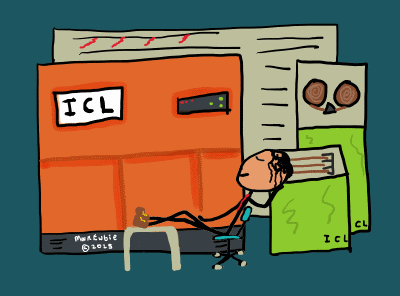Workplace Miscommunication
The Day the Processor Fell Over
This is a tale from the times when companies had a computer room with air-conditioning and staff on site. Our mid-sized computer took up a whole room. The processing unit — a metal box eight feet tall, similar length and two feet wide. Disk drives the size of washing machines. Tape drives seven feet tall. Two large floor-standing printers.
Long before computer science became a thing. The people who looked after the machine were average intelligence, barely qualified and young. I was one of them.
We changed tapes, pressed buttons and followed instructions. No one outside of the computer room had a clue what we did. They thought we just messed about having fun. They were right. It was fun.
We weren’t like the video operators who spent all day in front of their computer terminals entering customer orders. We were computer operators. A step up. We were a mystery to management who didn’t know what we did, and were largely left to ourselves.

Operating an ICL1900 mainframe
Every morning at 8:00 we would power up the computer ready to serve the business for the new day. We couldn’t leave it switched on overnight, as is the correct procedure, because the managing director insisted it was switched off at the end of each day.
The same managing director who came into the air-conditioned Halon-protected environment after lunch one day and flicked his cigar ash on the floor. “What do you think of that?” he said as he exercised his importance.
Cool. A new buzzword. Filed for further use.
Meanwhile, people are coming in to work in both offices. I liked the people in our office. I knew them. Chatted to them. I didn’t really know the ones at the other site. They didn’t know me.
A morning of explanations started. The system is down, we called an engineer, hoping they will fix it, nothing we can do. Apologies. Call after call. Visits in person from people, popping their head round the computer room door.
At 9am a call from the sister company. “Why aren’t the systems working?” An annoyed, hassled and irritated call.
I had answered many queries by now. I was in the swing of it. The light of attention was on us and our beloved system. And I had learned a new term.
“The processor’s fallen over, we’ve called an engineer,” I replied, in a fairly flippant, what-the-hell-can-I-do manner. I went back to chatting with colleagues because we had a morning off. No printing or tape changing required. Nothing to do except drink coffee and smoke. Smoking was allowed in offices back then. Not in the computer room though.
So we all stood around, or sat, or read a paper.
He burst into our room where we were chatting and lazing around. We were not the picture of diligent computer scientists shown on the TV at the time. I wore long hair, jeans and Doctor Martens. Boffins we weren’t.
He asked what the hell had happened to the computer. We explained. He asked to look at the computer. We showed him. He asked to look at the processor — we showed him that too. A giant metal behemoth, eight feet tall, bolted to the floor.
It was a pointless exercise in my opinion. What the hell would he know about it? He seemed to grudgingly accept the explanation for the failure and went off for further discussions with our managing director.
I didn’t understand why he had been so annoyed. It wasn’t our fault. We’d rung for help, followed our procedures. Done everything right. We’d even been fairly polite to the users with their constant complaining.
It later transpired that my flippant response — “the processor’s fallen over” — during the support call from the sister office had been misconstrued. They had assumed that we, a bunch of young fools, had been larking around in the computer room and physically knocked the processor over. No wonder Mr. MD was upset.
As techies we had a good laugh about the stupidity of users. The usual stuff.
But I never used that expression again to non-computer people. Communication is important.
Created by Mark Ewbie. Last Updated August 30, 2025.